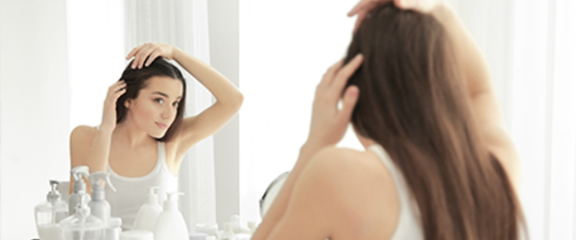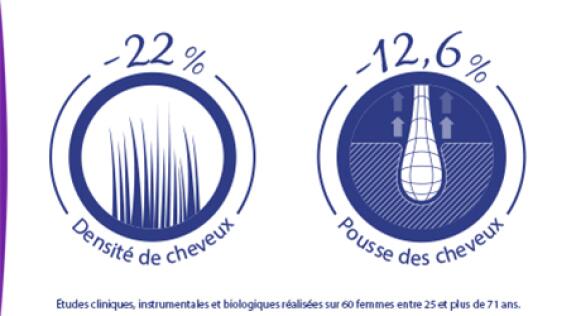- SUMMARY
- Hair aging
What is aging of hair?
- What are the signs of aging of hair?
- What should you do when hair becomes weaker and thinner?
- Porous hair: how to identify and control it
- Hair loss: what should you do when your hair is falling out in clumps?
- Is it normal for hair to stop growing?
- Hair loss and loss of hair volume: what's the difference?
What is aging of hair?
Skin is not the only thing that bears the marks of time. Over the years, your hair type also changes. Hair loses its density, thickness and volume. Hair becomes thinner and growth reduces, not to mention the white hair that appears... Just like with wrinkles, the aging of hair spares no one: everyone, both men and women, is affected.

The aging of hair, a completely natural process
We're used to hearing about the aging of skin (or cutaneous aging), but hair aging is significantly less talked about. However, if we fully understand that facial skin is affected by time, then why would it be any different for the scalp and hair? There are several warning signs.
White hair
Firstly, the appearance of gray and white hair; these small hairs which irritate men and women when they look in the mirror. It is one of the first signs of hair aging. Like all cells in the human body, the activity of melanocytes decreases over time. These cells, located at the hair root, are more or less full of pigment (called melanin), which allows them to add color to hair (this can be either dark or light). When the melanocytes slow down and then stop the production of melanin, white hair begins to grow. This often occurs from the ages of 45-50, however this is not the case universally. Depending on the person, it can happen much earlier.
Flat and thin hair that is difficult to style
The scalp's ecosystem eventually deteriorates: as micro-circulation is no longer sufficiently stimulated, blood flow in the hair root is limited. Less oxygen and nutrients (vitamins and trace elements) necessary for a good hair growth rate are supplied. The sebaceous glands produce less sebum, the natural oily film which helps to hydrate and protect the scalp and hair. Result: hair becomes thinner, dry and dull, loses volume and grows more slowly. This is the beginning of thin and flat hair that is more difficult to style.
Thin hair, flat hair and growth issues, when hair aging is obvious
The effect on the hair's life cycle
Aging or mature hair is more difficult to live with and maintain each day. It becomes thin and drier, and split ends appear in the lengths. The aging of hair inherently changes the hair life cycle (or hair cycle).
Results of hair aging:
- thin hair, which can give the impression of flat hair,
- real problems in getting your hair to grow,
- a loss of shine and volume.
External factors which weaken hair
It's a process which really isn't helped by the environment and our lifestyles: pollution, smoking, overusing hair straighteners and hair dryers, chlorine from your aquagym class (hence the benefit of wearing a swimming cap), repeated coloring, highlights or balayage, hair products that may not necessarily be suitable, and hormonal changes... Together, these factors weaken hair. This results in hair styling becoming difficult, and leads to many women choosing to cut their hair.
The figures from a clinical study conducted by our laboratories* are unmistakable: hair aging leads to a loss of volume of 22%, a 12.6% decrease in hair growth, an 18% decrease in hair strength, and a 50% increase in hair porosity.
*Clinical, instrumental and biological study conducted on 60 Caucasian women. Comparative study between two age groups: 25-35-year-old and over 71.

Hair aging in men and women: is it the same struggle?
Yes! In both men and women, the signs of hair aging are the same: hair goes gray and then whitens, it becomes thinner and duller... What are some of the solutions to prevent and care for aging hair in women as well as men?
Advice to follow each day
- At the very least, incorporate an antioxidant shampoo tailored to hair aging into your hair care routine.
- And as a long-term strategy, begin a treatment of food supplements which will improve hair quality, restore hair volume and thickness, and stimulate its growth rate. Patience is required: these treatments must be taken for a minimum of 3 months.
- At the same time, a good lifestyle, in particular a healthy and balanced diet, helps provide the essential nutrients for beautiful hair.
Alopecia or hair aging?
Lastly, we often tend to associate male baldness with aging. However, alopecia and hair aging in men are not linked. Baldness (also called alopecia) can occur at any age. It can happen at 25 years old, just as at 55, or in the case of some men, not at all. In reality, it's more a question of genetics than hair aging.
Alopecia can also affect women, especially as a result of hormonal changes.
Our care routines
Thin and brittle hair
